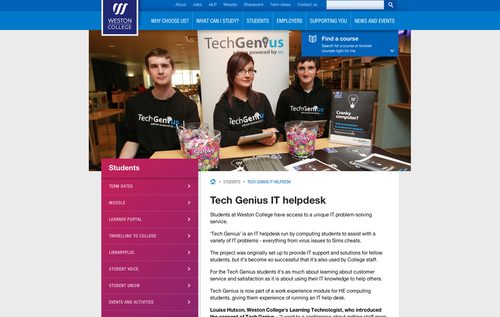Representing Falmouth University, Cornwall and Higher Education at the event, Amy Sampson and I gained a great insight into and provided feedback on the creative implementation of some inspirational learning technology projects.
Students and staff from our region’s Further Education establishments presented on a range of topics, including iPads for Students with Learning Difficulties (City of Bristol College) and redesigning delivery of staff development sessions (Gloucestershire College).
Two presentations from Weston College described familiar tales of limited IT support resources and staff engagement respectively, and identified and delivered creative and inspiring solutions to the issues.

The college’s Tech Genius helpdesk, provides peer support for students and staff with IT problems. Using bespoke helpdesk software designed and built by the students, the team can spin up an instance of TechGenius anywhere on campus and also connect from their own devices to log and resolve calls. It’s a small, yet easily scalable solution that creates a learning partnership where students can advise staff on on their everyday IT problems.
One of the key elements of the software for the Learning Technology team was the ability to generate visual reports of user/hardware/software data, and discussion around this topic segued nicely into Weston’s next presentation.
Called “eVolution”, their approach towards Staff Development had facilitated development of digital literacies amongst staff and encouraged the formation of a community around digital and online teaching practices.
Getting teaching staff to engage critically with technology on a professional level is one of the core ambitions of an Educational Technology department. Recognising that many of our staff are Associate Lecturers and not often on campus, we can’t expect to fill lecture theatres or even seminar rooms and deliver training one-to-many.
How can we reach out to staff off campus, facilitate the conversation around technology and create an environment which nurtures the development of digital literacies?
One way in which Weston are tackling this is by assigning a technology mentor to a member of staff who volunteers to be part of the eVolution project. Looking through the scheme of work, a task or activity will be identified that might benefit through the application of a particular technology (use of pinterest, a quiz in Moodle etc). The mentor will be on hand within the teaching environment to assist with the technological delivery and then the staff member and the mentor review the experience.
Staff who have been involved with the project value being part of the eVolution community and this leads to sharing of best practice amongst colleagues. It also encourages those who are least familiar with technology to explore the applications within their own teaching.
I particularly liked the staff centred approach to this. Initially put forward by HoDs, staff soon volunteered to become part of the project and with some great project planning and slick branding and marketing behind it, the focus was totally experience led, the technology becoming invisible as it becomes part of the teaching.
Here’s a link to the JISC case study:
http://www.jiscrsc.ac.uk/southwest/news/2014/feb/evolution-staff-development-project-enhancing-staff-knowledge.aspx